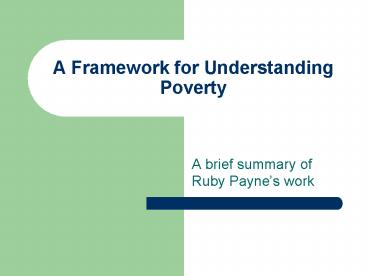A Framework for Understanding Poverty - PowerPoint PPT Presentation
1 / 18
Title:
A Framework for Understanding Poverty
Description:
A Framework for Understanding Poverty A brief summary of Ruby Payne s work Types of Poverty Generational Poverty: being in poverty for at least two generations ... – PowerPoint PPT presentation
Number of Views:1638
Avg rating:3.0/5.0
Title: A Framework for Understanding Poverty
1
A Framework for Understanding Poverty
- A brief summary of Ruby Paynes work
2
Types of Poverty
- Generational Poverty being in poverty for at
least two generations - Situational Poverty lack of resources as a
result of some event (death, divorce, etc.) - Poverty Levels
- Prevailing Attitude in GP Society owes me a
living - Prevailing Attitude in SP I wont accept
charity. - Poverty is rarely about a lack of intelligence or
ability
3
Hidden Rules
- Unspoken cues and habits of a group
- Different for different groups racial
differences are often noted, but economic
differences exist as well - Students need to be taught the hidden rules of
the middle class (not in degradation of their own)
4
Characteristics of Generational Poverty
- Background noise
- Importance of personality
- Significance of entertainment
- Importance of relationships
- Matriarchal structure
- Oral language tradition (casual register)
- Survival orientation
5
- For men, being manly is key. Hard work,
fighting, loving - For women, rescuer/martyr role is key (take care
of children and men) - Importance of non-verbal/ kinesthetic
communication - Ownership of people
6
- Negative orientation (failure is belittled)
- Punishment is about penance/forgiveness, not
change - Belief in fate, not choice
- Polarized thinking everything is black and white
- Sexuality is key. If you dont have resources,
you have your body
7
- Time the future doesnt exist time is flexible
and not measured - Sense of humor (valued for entertainment)
- Lack of order/organization
- Living in the moment, not setting goals/planning
ahead
8
Student Behaviors You May See
- are disorganized, dont have signatures, lose
papers - have many excuses
- dont do homework
- are physically aggressive
- like to entertain
- only see part of what is on the page
- only do part of the assignment
9
- cant seem to get started (no procedural
self-talk) - cannot monitor own behavior
- laugh when they are disciplined
- decide whether or not theyll work/behave based
on whether they like you or not - use casual language register
- dont know/use middle-class courtesies
- dislike authority
- talk back and are extremely participatory
10
Registers of Language
- Frozen language is always the same (Pledge of
Allegiance, Lords Prayer, etc.) - Formal Language of work and school complete
sentences, specific word choice - Consultative Formal register in conversation
- Casual Language between friends. 400-800 word
vocab., dependent on non-verbal assists, syntax
often incomplete - Intimate Language between lovers or twins
11
- /- one register in conversation is acceptable
/- two registers or more is socially offensive - Most poor and minority students do not have
access to the formal register - Standardized tests rely on formal register
- Communicating in writing without non-verbal
assists is problematic
12
- Primary Discourse language of the home
- Secondary Discourse language of larger society
that is required for social functioning - Discourse is learned when one has a significant
need to use it (relationship) - Learning secondary discourse in the absence of
relationship requires direct teaching
13
- Formal discourse pattern
- speaker gets right to the point
- Casual register discourse pattern
- speaker goes around the issue before getting to
the point - Impact parent conferences, written expression
14
Bridging Differences in Language Register
- Have them write in casual register, then
translate into formal - Allow them to express displeasure in formal
register when they do, they wont be reprimanded - Graphic organizers
- Use stories. Tell them both ways.
15
- Teach formal register directly
- Recognize that many students use casual register
as primary discourse - Utilize opportunities for instruction regarding
appropriate register (e.g., classroom outburst of
This sucks!)
16
Voices
- Child defensive, victimized, emotional, strongly
negative, non-verbal - Parent authoritative, directive, judgmental,
demanding, punitive, sometimes threatening - Adult non-judgmental, factual, often formatted
in questions, attitude of win-win
17
Getting Out of Poverty
- goal or vision of something they want to be/have
- situation that is so painful that anything would
be better - someone who is a role model or sponsor
- specific talent or ability that provides an
opportunity
18
- Schools can teach children the hidden rules and
choices of middle class. - School staff members can be important role models
- Students need help developing emotional
resources, esp. since success often means
self-governance of behavior - In discipline, give structure and choice.
- The true discrimination that results from poverty
is a lack of cognitive strategies.

